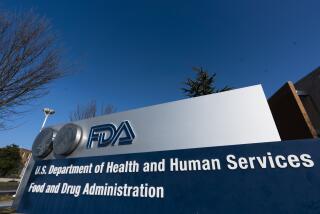Genetic ‘Marker’ May Be Cancer Weapon
- Share via
UCLA cancer researchers have discovered a genetic “marker” in breast cancer cells that they believe may help predict which patients will do well after treatment and which will not.
The ability to make such predictions would help doctors identify those who might benefit from more aggressive treatment, perhaps leading to longer survivals, said Dr. Dennis Slamon, a cancer specialist and principal author of a report appearing in today’s issue of Science magazine.
At present, the most reliable predictor of the outcome of breast cancer is the degree of lymph node involvement: the greater the number of malignant nodes, the poorer the chances of survival.
But Slamon and researchers from the University of Texas Health Science Center in San Antonio and Genentech Inc. in South San Francisco have found an oncogene that is associated with breast cancer and can indicate poor outcome just as accurately as the number of malignant nodes, and maybe more so.
(An oncogene is a normal gene that is important in normal cellular growth but that is also believed to play a role in cancer under certain circumstances.)
Slamon and his colleagues have found that breast cancer patients whose tumor cells have three or more copies of a specific oncogene are more likely to have a relapse and to have a shorter survival time than women with only one or two copies of the oncogene.
The significance of this finding, Slamon said, is that it gives doctors additional information for deciding which patients should have chemotherapy or radiation in addition to surgery as initial treatment.
Among breast cancer patients with no cancerous lymph nodes, 20% to 30% develop relapses, despite breast removal. “If you knew ahead of time which patients would relapse, then you could treat them more aggressively with radiation or chemotherapy,” Slamon said.
But because both chemotherapy and radiation are very toxic, physicians generally prefer not to prescribe either unless absolutely necessary.
Slamon believes that a test to determine the number of oncogene copies would help them make a decision.
Researchers studying breast cancer tissues from 189 patients have shown that the number of oncogene copies was as reliable as the number of involved lymph nodes and was superior to other methods, such as tumor size or the presence of receptors for estrogen.




